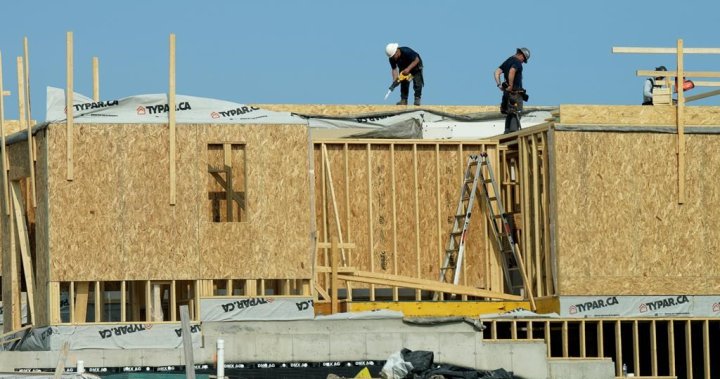As politicians duke it out over the terms of federal housing money in Ontario, behind the scenes some are hoping a deal can be made.
Tensions between the Trudeau and Ford governments on the housing file have been high in recent weeks, with arguments over affordable housing, fourplexes and municipal oversight.
Most recently, Ottawa dangled a $6-billion carrot in front of cities and provinces across the country, telling them if they met a number of conditions — including allowing four-unit buildings as of right — they could have a bite.
The condition is one Ontario Premier Doug Ford has repeatedly ruled out, talking about the backlash politicians who introduce too much density to the suburbs would face.
As the argument between the two levels of government continues, however, housing advocates say it is distracting from the real issues.
“I don’t really care who does the work. We need to get the three levels of government working together,” Tim Richter, president and CEO of the Canadian Alliance to End Homelessness, told Global News.
“The longer they keep fighting each other over who does what, or spending enough or not spending enough, that means we’re not getting housing built.”
Affordable housing argument
Cracks in the relationship between the two governments began to show when federal Housing Minister Sean Freaser wrote to his Ontario counterpart, Paul Calandra, telling him specific affordable housing funds would be stopped.
Fraser told Calandra there was an “urgent need” for Ontario to revise its outline of how it planned to spend federal money for affordable housing. Under the National Housing Strategy Action Plan, initially signed in 2018, the province has to show how it will spend federal dollars to expand affordable housing.
Ontario’s plan to do that, according to Fraser’s letter, was a “disappointment” and would lead to the province losing $357 million in federal money.
The email you need for the day’s
top news stories from Canada and around the world.
Calandra quickly replied, accusing the federal government of threatening “our most vulnerable” by withholding the money.
The disagreement focused on how Ontario was spending its money and whether or not it was building enough new housing.
The federal government said the province had failed to build 94 per cent of its target of 19,600 new affordable units. Ontario said 11,000-plus old units had to be refurbished first to avoid existing affordable housing coming offline and asked to count them toward its target.
“Ontario is lagging desperately behind all other provinces and territories,” Fraser wrote in his letter.
In his reply, Calandra asked the federal minister to “carefully consider” the province’s unique situation. The provincial housing minister then wrote to service managers, warning them their funding could drop dramatically from April 1 with the federal government threatening to withhold funding.
Calandra’s office told Global News on Tuesday, April 2, that the federal government had “decided not to accept” its proposal under the deal.
“As it stands now, their decision to put politics first threatens to harm tens of thousands of low-income Ontario families that rely on this funding,” the housing minister’s office said.
Asked on Friday if funding had been withheld, Calandra’s office said they had no new information to release.
At the same time that Calandra and Fraser were exchanging blows on the affordable housing file, the federal government announced a new stream of money. Prime Minister Justin Trudeau said Tuesday he was opening a new $6-billion pot of federal housing money for municipalities and provinces across the country that met certain conditions.
The fund is set to give $1 billion to municipalities across the country immediately, with the remaining $5 billion subject to negotiations with the provinces and territories, similar to discussions over new health-care funding, pharmacare or child care deals.
Announcing the funding, the federal government said it would come with binding conditions that lower levels of government must adhere to in order to qualify for the cash.
One of the conditions set out by the Prime Minister’s Office is that provinces must “require municipalities” to accept four units as-of-right and allow more “missing middle” housing, including duplexes, triplexes, townhouses and multi-unit apartments.
Ontario Premier Doug Ford has railed against allowing the four-unit buildings or four-storey homes across the province, saying he won’t tell cities what to do and warning they would be a “ massive mistake.”
At an announcement in March, Ford said the policy was “off the table” for his government, musing about the potential backlash to larger buildings in suburban neighbourhoods.
“I can assure you 1,000 per cent, you go into communities and start putting up four-storey, six-storey, eight-storey buildings right deep into communities, there’s going to be a lot of shouting and screaming,” Ford said on March 21.
Behind the scenes, a senior provincial source said the government remains confident the discussions with the federal government — while billed as binding publicly — will be a negotiation. They pointed to the child-care deal brokered between the federal government and Queen’s Park, which saw Ontario wait much longer than other parts of the country and receive its own unique concessions.
The provincial source also referred to the City of Ottawa, which was granted some money from the federal housing accelerator funding pot without automatically allowing fourplexes, a condition that had been billed as a key trigger for the cash. The source said that, while Ontario won’t be telling cities or towns to allow fourplexes as of right, it will not be stopping them either.
A federal source agreed that conversations and negotiations still needed to take place but stressed that if provinces didn’t meet the federal conditions, they wouldn’t get the money.



